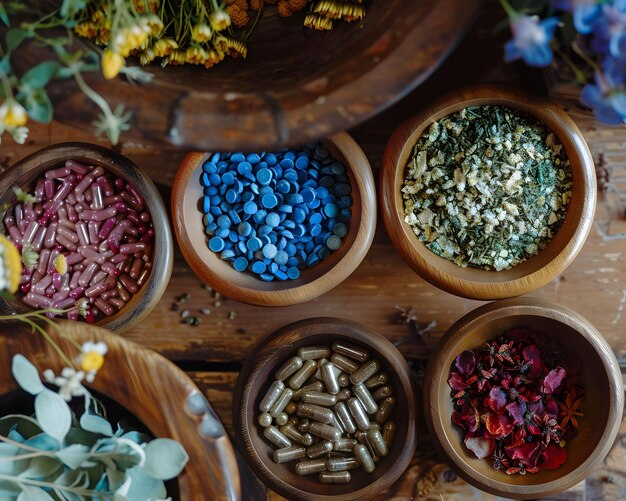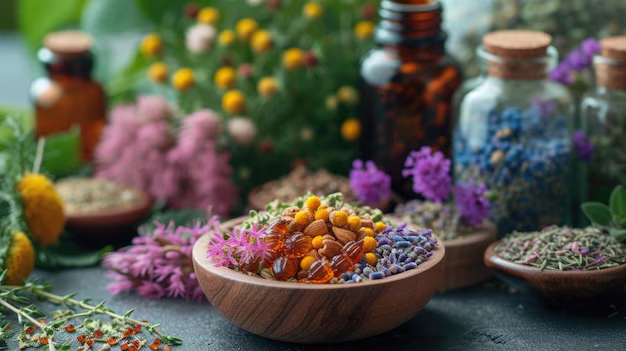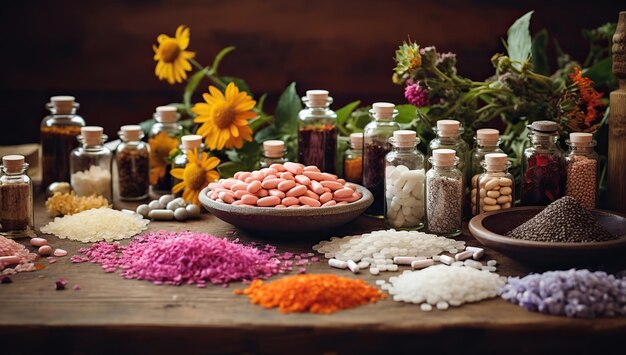
Herbal medicine has a lot of advantages for health; however, one must identify the possible risks and side effects very well. Natural remedies are considered to be safe but they also come with the danger of drug interaction and side effects. In order to find out about suitable use and possible dangers of herbs, it is strictly imperative.
Let’s know some common risks and side effects and also describe what can be done in order to use herbal treatments at home as safely and correctly as possible.
What are the common side effects of herbal medicine?
Common side effects of herbal medicine include digestive issues, allergic reactions, and skin irritation. Some herbs, like ginseng, may cause headaches or insomnia if used excessively. Always monitor your body’s response and discontinue use if you experience adverse effects.
Most assume herbal medicine to be safe, however, adverse reactions can happen as far as the herb employed, its dosage, or the user’s level of sensitivity. For example, St. John’s Wort causes photosensitivity, while prolonged use of licorice root may elevate blood pressure. Nausea, diarrhea and, or ‘bloated’ stomachs following on the heels of some herbs may be common digestive complaints.
Similarly, skin irritation as well as allergic reaction towards the skin often especially occurs through topical application of essential oils. Understanding how your body reacts and talking to a doctor prior to the use of any herbs may help to reduce the possibilities of these events. Also, avoid jumping straight to higher intake amounts. It is always safer to start low and later increase as you note how well it is tolerated.
Can herbal medicine interact with prescription drugs?
Herbal medicine can interact with prescription drugs, potentially altering their effectiveness or causing adverse reactions. For instance, St. John’s Wort can reduce the efficacy of birth control pills. Always consult a healthcare provider before combining herbs with medications.
Some herbs can interact with prescription drugs either positively or negatively and have dangerous results. An example of this would be taking blood thinners together with ginkgo biloba which increases risk of bleeding. Taking St. John’s wort also induces an interaction with many medicines such as antidepressants and contraceptives and diminishes their action.
Other forms such as herbal teas, herbal supplements and essential oils are also structurally modifying altering the pharmacokinetics of drug absorption. Always be sure to avoid dangerous interactions by letting your doctor know any herbs you are taking in addition to prescription medications. Coordination of herbal and allopathic treatments must be timely and responsible to ensure safety of patients.

What precautions should be taken when using herbal medicine?
When using herbal medicine, start with low doses, avoid combining herbs with similar effects, and consult a healthcare provider for guidance. Pregnant women and those on medications should take extra precautions to avoid harmful interactions.
To use herbal medicine properly, the risk of getting hurt from it is avoided. Small initial doses should be tried first in order to know the reaction the body would provide, especially on new herbs. Since the aim is not to heap additional sedatives on top of one another, herbs with similar characteristics must only be few in number so as not to take them at the same time.
Pregnant and breastfeeding females should be recommended by the health care provider according to their condition prior to medication; and diagnosed patients with specific medical conditions. There is the proper usage of herbs, and that requires monitoring of body reactions for abnormal responses, knowledge of the right dosage, and research on possible interactions with medication. Proper education and direction will avoid undesirable outcomes.
Are there specific herbs that should be avoided during pregnancy?
There are specific herbs like pennyroyal, mugwort, and black cohosh should be avoided during pregnancy due to their potential to cause uterine contractions or other harmful effects. It’s crucial to consult a healthcare provider before using any herbal remedies during pregnancy.
Pregnant women should avoid using herbal remedies because certain herbs may have risks such as miscarriage or preterm labor. Certain herbs historically used to induce menstruation such as pennyroyal or mugwort should not be ingested. Black cohosh tea, considered a proficient help during menopause might also trigger contractions of the smooth muscles in the uterus enhancing risks during conception.
Even a common herb like peppermint or ginger should be consumed in moderation and only after the first trimester. It is advisable to seek the help of a qualified and practicing doctor with regard to the herbal treatments concerned with supplementation during pregnancy so that neither mother nor infant is put at risk.
What are the risks of using herbal supplements long-term?
The risks of using herbal supplements long-term can lead to dependency, toxicity, or diminished effectiveness. Some herbs, like licorice root, can cause high blood pressure with prolonged use. Regular monitoring and periodic breaks are recommended to reduce potential risks.
Herbal products and supplements can be of certain health benefits but use of such products on regular basis for long can be dangerous like for example, misuse or chronic poisoning. Chronic use of high doses of kava has been shown to be hepatotoxicity. Continuous consumption of licorice root increases blood pressure and lowers potassium.
Furthermore, some of the herbal dietary supplements may not be as effective over time because a tolerance develops in the body. To reduce the risk of such occurrences, it is best to cycle off the use of the herbs’ school session or the use of certain aids with a proper prescription. Regular visits with the doctor will in turn ensure that the long term use of herbs is effective.

How do allergic reactions to herbs manifest?
Allergic reactions to herbs can manifest as rashes, hives, itching, or swelling. In severe cases, reactions may include difficulty breathing or anaphylaxis. Always perform a patch test with new herbs, especially topical applications, to minimize the risk of reactions.
Various allergic symptoms to herbs have been documented, including rashes, hives, and local pruritus. Essential oils, such as tea tree or lavender oil used on the skin, can also produce such irritation or allergic response. Physical irritation from ingested herbal treatments may also occur, but this is common among those who are allergic to plants. In very rare occurrences, there may be anaphylaxis which makes it difficult to breath and is a medical emergency.
In advance of applying new ratio bliss, employees can avoid allergic reactions to the herbal topical. In the case of eating herbs, it is recommended to limit the portion to the smallest one and monitor the reaction of the organism. Any allergy symptoms would require an immediate stop in treatment and may warrant further medical intervention.
Can children safely use herbal medicine?
Children can safely use herbal medicine, but dosages should be much lower, and certain herbs like eucalyptus or ginseng should be avoided. Consulting a pediatric healthcare provider before introducing herbal remedies is crucial to ensure safety.
While herbal medicine may have a place in treatment for children, dosages must reflect their pediatric level. Still, caution should be exercised when treating youngsters with herbs as they react differently than adults would. While most herbs, for instance, fennel and chamomile are considered to be safe for infants and often used by them as a remedy for bellyaches, others could be too strong for the wee babies, e.g., eucalyptus or ginseng.
Care should be taken and any herbal supplement given to the child on the prescription of a pediatric healthcare provider. Oils are also banned for kids under 2 years, as it can cause respiratory problems. Parents are suggested though to give herbal medicine to children.
In Conclusion
It is still basic to assess and be conscious of the dangers and risks of herbal medicine use. It is undoubtedly that herbs are medicinal plants and patients need them, but patients should be knowledgeable of the danger with herbal plants also. Severe adverse effects that can be of cumulative nature over time may be prevented by being observant of proper dosages recommended, seeking medical advice, and being aware of the response of the body to medication. Thus, they contribute to health and changes to be prevented and maybe altered or change diseases.

